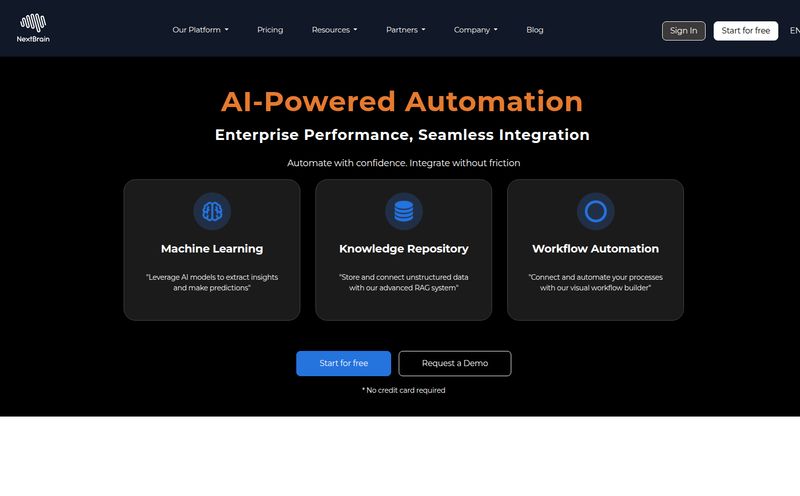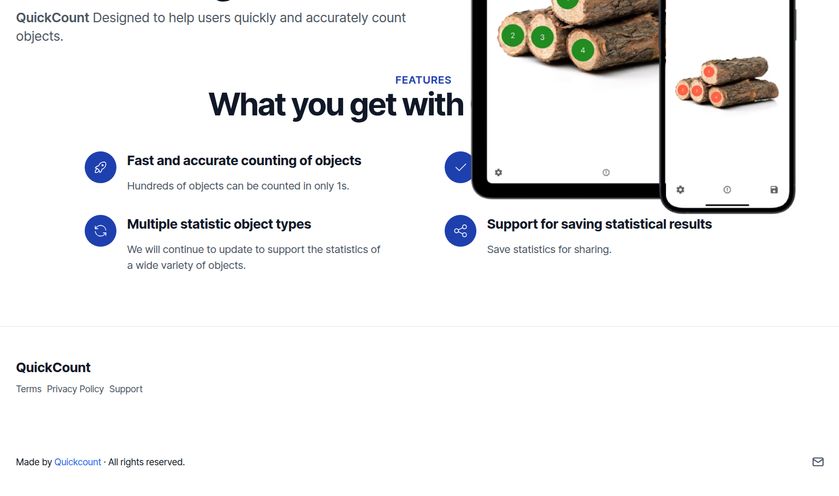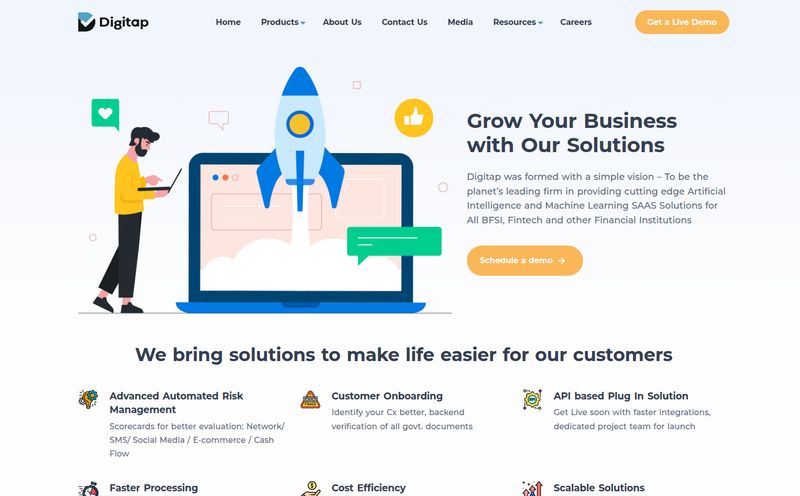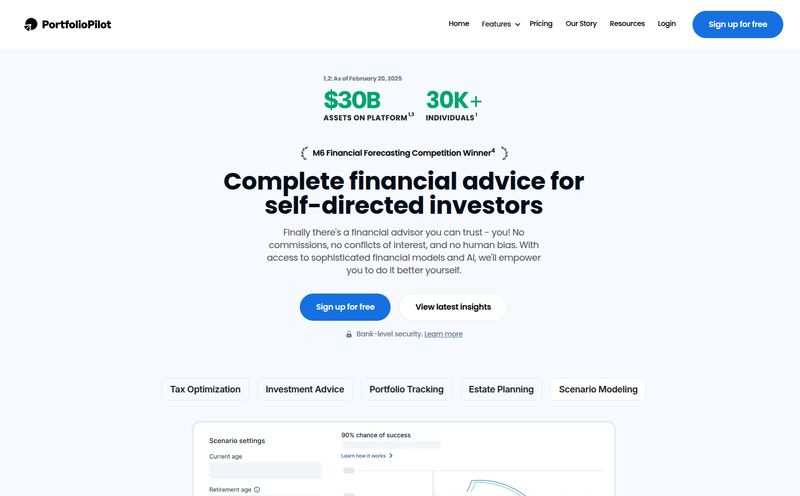If you’ve been in the property game for more than five minutes, you know the feeling. It's that pit-in-your-stomach cocktail of excitement and sheer terror when you’re looking at a potential investment. You’ve run the numbers a dozen times on a spreadsheet that’s starting to look like the Matrix. You’ve driven by the place at three different times of day. You've even tried to casually ask the mailman what he thinks of the neighborhood.
We’ve all been there. It’s called analysis paralysis, and it’s a killer. We’re trying to make a massive financial decision based on a mix of public data, gut feelings, and what a real estate agent (who, let's face it, has a vested interest) tells us. For years, I've thought, there has to be a better way.
Well, it seems like the AI wave is finally crashing on the shores of real estate investment. A new tool called Property AI has been popping up on my radar, promising to take the “guesswork” out of the equation. But as an old-school SEO and traffic guy who’s seen a million 'game-changing' platforms come and go, I'm naturally skeptical. So, I decided to put on my investor hat and see if this thing is the real deal or just more digital snake oil.
So, What Exactly Is Property AI?
In a nutshell, Property AI is a mobile-first tool designed to be your data-savvy sidekick for real estate investing. Think of it less as a simple property search engine and more like having a pocket-sized real estate analyst. It's designed to crunch the numbers on potential investments, analyze market trends, and spit out insights that help you, the investor, make a smarter, data-backed decision. The entire premise is to move beyond the emotional, “Oh, but it has such a lovely porch!” and into the cold, hard profitable facts.
It’s not about replacing your intuition—which, by the way, is still incredibly valuable—but about augmenting it with some serious computational power. It’s like giving your gut feeling a PhD in statistics.
How It Claims to Work: The Three-Step Simplicity
The folks behind Property AI seem to understand that investors are busy people. The process they lay out on their site is refreshingly simple. No ten-day training course required, apparently.
It boils down to a three-act play:
- You Feed the Machine: First, you input the details of a property you’re eyeing. This isn't just the address. We're talking size, number of rooms, amenities, maybe even the condition. The nitty-gritty stuff.
- The AI Does its Thing: Next, the platform’s brain kicks in. It takes your input and smashes it against a mountain of market data—local rental rates, historical occupancy trends, neighborhood comps, and who knows what other secret sauce they’ve got bubbling away.
- You Get the Blueprint: Finally, it serves up a report with actionable tips. It doesn’t just say “this is a good buy.” It says, “this is a good buy, and here’s how to make it even better.” It gives you those “Value Boost Tips” to supposedly maximize your returns.
It all sounds slick and easy. Maybe a little too easy? Let's look closer at the engine under the hood.
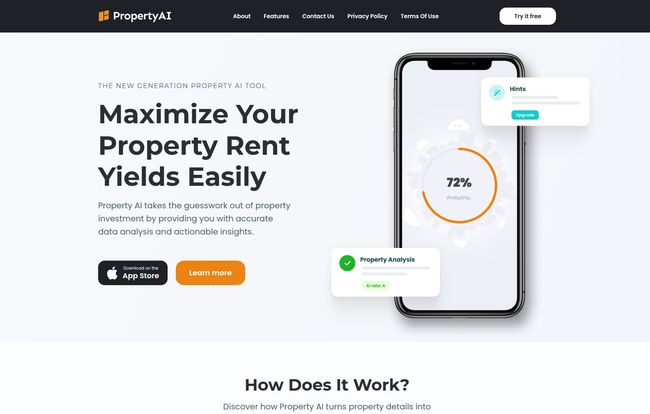
Visit Property AI
A Closer Look at the Key Features
This is where the rubber meets the road. A flashy landing page is one thing, but the feature set is what determines if a tool gathers digital dust or becomes part of your daily workflow.
In-Depth Property Assessment
This goes beyond a simple Zestimate. Property AI claims to give you a deep look at a property's potential profitability. This means it's not just valuing the bricks and mortar, but evaluating its viability as a cash-flowing asset. For a rental investor, the purchase price is only one part of a very large, and often complicated, puzzle.
Actionable Investment Insights
Here’s the part that gets my attention. The tool promises to predict things like vacancy periods, optimal rental costs, and of course, the big one: Return on Investment (ROI). Predicting vacancy rates is notoriously difficult and can absolutely wreck your annual numbers. A 5% vacancy rate versus a 10% vacancy rate is the difference between a good year and a bad one. If their AI can get this even close to accurate, that alone could be worth the price of admission.
Personalized Market Tips
This is the “Value Boost” feature, and I find it intriguing. Is it going to tell you that a fresh coat of greige paint will increase rent by $50? Or that adding an in-unit washer/dryer in this specific neighborhood has a 2-year payback period? Actionable, specific advice like that is gold. Generic advice like “make it look nice” is not. The screenshots suggest it offers concrete capitalization projects, which is a very promising sign.
Comprehensive Reporting
Data is useless if you can't understand it. The app's interface looks clean, presenting key metrics like monthly rent and occupancy rates in a clear, mobile-friendly format. For investors who are constantly on the go, analyzing a deal while waiting in line for coffee, this kind of accessible reporting is a must.
The Big Question: Can You Trust the Data?
Alright, let’s address the elephant in the room. Any AI tool is only as good as the data it’s trained on. This is the classic “Garbage In, Garbage Out” problem. The effectiveness of Property AI hinges entirely on two things: the quality of its underlying market data and the accuracy of the details you provide.
If you tell it a 2-bedroom apartment is a 4-bedroom, it’s going to give you some wildly optimistic—and wildly incorrect—projections. So, you still need to do your homework. But what about their data? The company doesn't publicly list its data sources (few do), but we can assume they're pulling from a mix of public records, MLS data, and aggregated rental listing sites. This is standard practice, but the quality of that data can vary wildly by region.
My take? You use a tool like this to get a powerful, data-driven baseline. It flags opportunities and red flags you might have missed. But you don't blindly trust it. You verify. It’s a co-pilot, not the autopilot. Some might argue that this defeats the purpose, but I disagree. It saves you from the initial 10 hours of spreadsheet drudgery, letting you focus your energy on verifying the most promising leads.
What's the Catch? A Look at the Potential Downsides
No tool is perfect. While the data-driven approach is a huge plus, it can’t account for everything. An AI can’t measure the vibe of a street. It doesn't know that a noisy bar is opening up next door, or that the city just approved plans for a beautiful new park down the block. That hyper-local, human intelligence is still your job.
Also, it seems to be heavily reliant on you feeding it properties. It’s an analysis tool, not necessarily a discovery tool. You can't just say “find me a good deal in Austin.” You have to bring the potential deals to it for a check-up.
Let's Talk Money: The Elusive Property AI Pricing
Naturally, the next question is 'what's this going to cost me?'. And honestly? I'm not entirely sure. I went looking for a pricing page on their website, a pretty standard thing to look for, and… well, I hit a digital dead end (a classic 404 error).
"The resource requested could not be found on this server!"
This isn't uncommon for new software tools, especially in the B2B space. They often want you to get in touch for a demo so they can sell you on the value before revealing the price. I would speculate they might be working on a tiered subscription model—perhaps a free version for one or two reports, and then a monthly fee for unlimited analyses. Or maybe a pay-per-report structure. For now, the cost remains a bit of a mystery. They do have a “Try it free” button, so that’s probably the best entry point.
Who Is This Tool Actually For?
I see two main groups getting a ton of value here:
- The New Investor: If you're just starting out, the fear of making a massive mistake is real. A tool like this provides a safety net and an educational framework. It forces you to think about the right metrics from day one.
- The Scaling Investor: If you’re an experienced investor looking to analyze more deals faster, this is an efficiency play. It automates the initial number-crunching, freeing you up to do what humans do best: negotiate, build relationships, and scope out the on-the-ground reality.
It might be less suited for a large institutional fund with its own team of analysts, but for the individual investor or small-time landlord, it seems to hit a sweet spot.
My Final Take
So, is Property AI the secret weapon we’ve all been waiting for? It's too early to call it a revolution, but it’s a very, very interesting step in the right direction. The idea of democratizing real estate data analysis is powerful. For too long, the best data has been locked away behind expensive subscriptions or institutional-grade software.
Property AI is trying to put that power into an app on your phone. It won't find the deal for you, and it won't sign the papers. But it could very well be the tool that stops you from buying a lemon or gives you the confidence to pull the trigger on a real winner. And in this market, that kind of data-driven confidence is priceless.
Frequently Asked Questions
Is Property AI a substitute for a real estate agent?
No, not at all. Think of Property AI as a data analysis tool, not a replacement for human expertise. A good real estate agent provides local knowledge, negotiation skills, and helps you navigate the complex closing process. Property AI provides data to help you and your agent make a more informed decision.
How accurate is the data from Property AI?
The tool's accuracy depends on both the quality of its market data sources and the precision of the property details you provide. It's best used as a strong starting point for analysis, which you should then verify with on-the-ground research and local expertise.
What kind of properties can I analyze with this tool?
The platform appears to be focused on residential rental properties, such as apartments and single-family homes. It's geared towards investors looking to analyze rental income, occupancy, and capitalization, which is most common in the residential sector.
Is Property AI available for Android?
Currently, the website prominently features a "Download on the App Store" button, suggesting it is available for iOS devices (iPhone, iPad). There is no mention of a Google Play Store app for Android at this time, but that could change in the future.
Can I use Property AI for commercial real estate?
Based on the features and language used (e.g., rental cost, occupancy rates, amenities), Property AI seems to be tailored specifically for the residential real estate market. Commercial property analysis involves different metrics (e.g., triple net leases, cap rates based on commercial tenants) that don't appear to be the focus of this tool.
